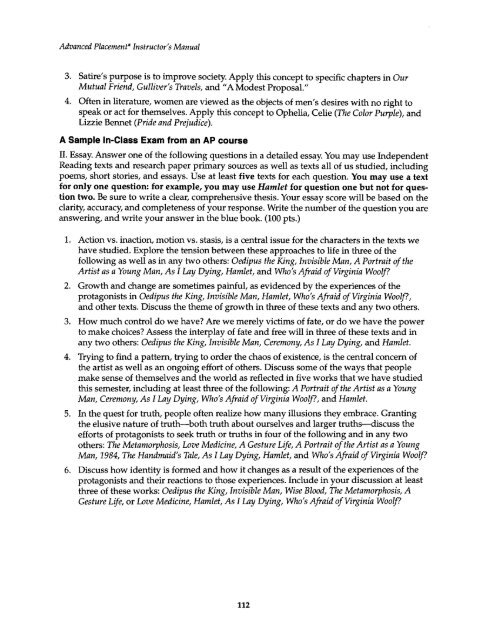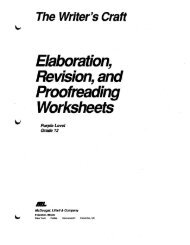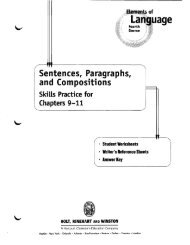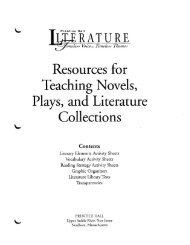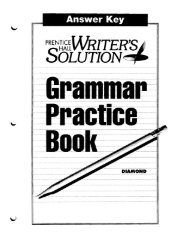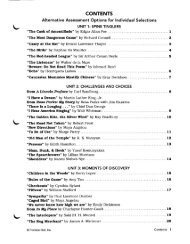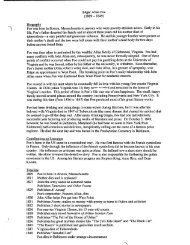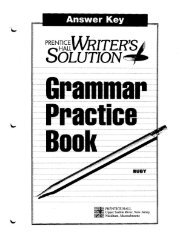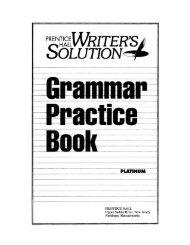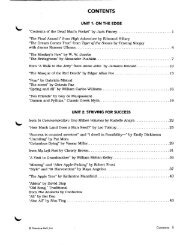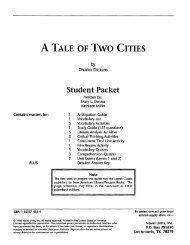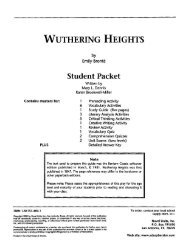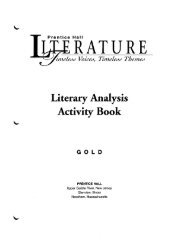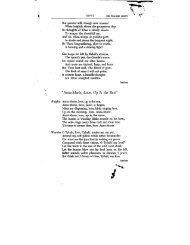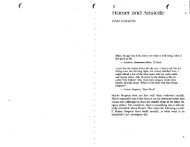English Literature & Composition - PopulationMe.com
English Literature & Composition - PopulationMe.com
English Literature & Composition - PopulationMe.com
Create successful ePaper yourself
Turn your PDF publications into a flip-book with our unique Google optimized e-Paper software.
Advanced Placement* Instructor's Manual<br />
3. Satire's purpose is to improve society. Apply this concept to specific chapters in Our <br />
Mutual Friend, Gulliver's Travels, and /IA Modest Proposal." <br />
4. Often in literature, women are viewed as the objects of men's desires with no right to<br />
speak or act for themselves. Apply this concept to Ophelia, Celie (The Color Purple), and<br />
Lizzie Bennet (Pride and Prejudice).<br />
A Sample In-Class Exam from an AP course<br />
II. Essay. Answer one of the following questions in a detailed essay. You may use Independent<br />
Reading texts and research paper primary sources as well as texts all of us studied, including<br />
poems, short stories, and essays. Use at least five texts for each question. You may use a text<br />
for only one question: for example, you may use Hamlet for question one but not for question<br />
two. Be sure to write a clear, <strong>com</strong>prehensive thesis. Your essay score will be based on the<br />
clarity, accuracy, and <strong>com</strong>pleteness of your response. Write the number of the question you are<br />
answering, and write your answer in the blue book. (100 pts.)<br />
1. Action vs. inaction, motion vs. stasis, is a central issue for the characters in the texts we<br />
have studied. Explore the tension between these approaches to life in three of the<br />
following as well as in any two others: Oedipus the King, Invisible Man, A Portrait ofthe<br />
Artist as a Young Man, As I Lay Dying, Hamlet, and Who's Afraid of Virginia Woolf?<br />
2. Growth and change are sometimes painful, as evidenced by the experiences of the<br />
protagonists in Oedipus the King, Invisible Man, Hamlet, Who's Afraid of Virginia Woolf?,<br />
and other texts. Discuss the theme of growth in three of these texts and any two others.<br />
3. How much control do we have? Are we merely victims of fate, or do we have the power<br />
to make choices? Assess the interplay of fate and free will in three of these texts and in<br />
any two others: Oedipus the King, Invisible Man, Ceremony, As I Lay Dying, and Hamlet.<br />
4. Trying to find a pattern, trying to order the chaos of existence, is the central concern of<br />
the artist as well as an ongoing effort of others. Discuss some of the ways that people<br />
make sense of themselves and the world as reflected in five works that we have studied<br />
this semester, including at least three of the following: A Portrait ofthe Artist as a Young<br />
Man, Ceremony, As I Lay Dying, Who's Afraid of Virginia Woolf?, and Hamlet.<br />
5. In the quest for truth, people often realize how many illusions they embrace. Granting<br />
the elusive nature of truth-both truth about ourselves and larger truths-discuss the<br />
efforts of protagonists to seek truth or truths in four of the following and in any two<br />
others: The Metamorphosis, Love Medicine, A Gesture Life, A Portrait ofthe Artist as a Young<br />
Man, 1984, The Handmaid's Tale, As I Lay Dying, Hamlet, and Who's Afraid of Virginia Woolf?<br />
6. Discuss how identity is formed and how it changes as a result of the experiences of the<br />
protagonists and their reactions to those experiences. Include in your discussion at least<br />
three of these works: Oedipus the King, Invisible Man, Wise Blood, The Metamorphosis, A<br />
Gesture Life, or Love Medicine, Hamlet, As I Lay Dying, Who's Afraid of Virginia Woolf?<br />
112


